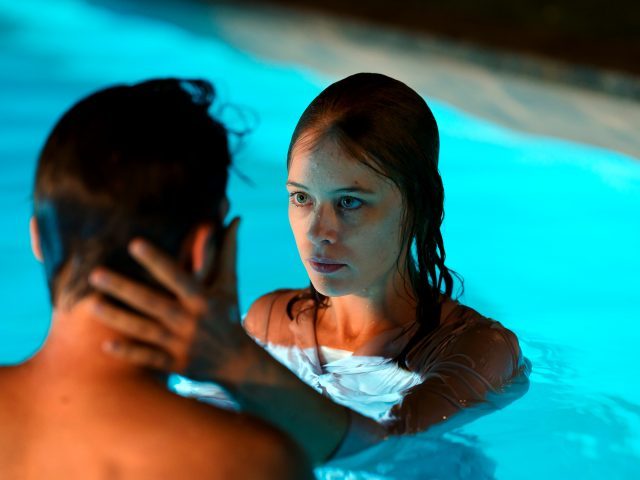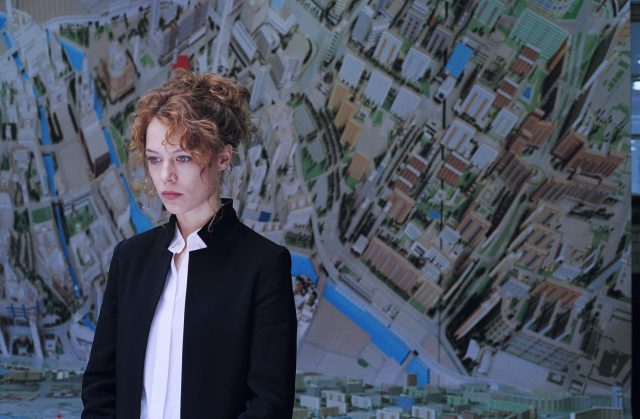
Paula Beer stars as the mysterious title character in Christian Petzold’s award-winning Undine (photo by Christian Schulz)
UNDINE (Christian Petzold, 2019)
IFC Center, 323 Sixth Ave.
Film at Lincoln Center,
Opens June 4
www.ifccenter.com
www.filmlinc.org
Master German writer-director Christian Petzold (Phoenix, Barbara) gives a unique contemporary twist to a classic European fairy tale in Undine, which opens June 4 at IFC Center and Lincoln Center as well as online. The less you know about the original myth the better, but let’s just say it involves a water nymph, romance, betrayal, and death.
Paula Beer was named Best Actress at the Berlin International Film Festival and at the European Film Awards for her powerful performance as Undine Wibeau, a historian who gives architectural tours of expansive, heavily detailed models of the past, present, and future of Berlin for the Senate Administration for Urban Development. Early on, when her boyfriend, Johannes (Jacob Matschenz), tells her that he is in love with another woman, Nora (Julia Franz Richter), Undine sternly says, “If you leave me, I’ll have to kill you.” There is no reason to doubt her.
Distressed by the situation, she is standing uneasily in a café, looking at an aquarium filled with colorful fish and a small statue of a diver when Christoph (Franz Rogowski), who just attended one of her talks, hesitantly approaches her and offers praise for the lecture. An accident shatters the glass of the aquarium and Undine and Christoph are knocked to the ground, drenched in water. As the fish squirm for life on the floor, Undine and Christoph instantly fall in love. “I’m usually under water,” Christoph, an industrial diver, says to her. German romanticism and French Impressionism mix with magical realism and a revenge thriller as Christoph and Undine run around together, reveling in their love until another accident results in serious trouble.

Undine (Paula Beer) is an architectural historian who is drawn to water in myth-based drama
Among the distinguished writers and composers who have told their own versions of the story of Undine are Friedrich de la Motte Fouqué, Oscar Wilde, E. T. A. Hoffman, Edgar Allan Poe, Sergei Prokofiev, Hans Christian Andersen, Seamus Heaney, Claude Debussy, and DC Comics. Audrey Hepburn won a Tony for her performance as the title character in Jean Giraudoux’s Ondine on Broadway in 1954. In 2010, Neil Jordan’s Ondine, coincidentally also released on June 4, starred Colin Farrell as a fisherman who catches a woman known as Ondine (Alicja Bachleda) who has a special connection with water.
Water is central to Petzold’s film, from the aquarium to Christoph’s job to Johannes’s pool. Berlin itself was built on a swamp, adding relevance to Undine’s architectural lectures, in which she explains that the name of the city means “dry place in the marsh.” When she is searching for Johannes, she goes into the men’s bathroom and one of the faucets is dripping, the noise echoing down an empty hallway. When Johannes wants to go away with Undine, he tries to lure her by mentioning he’s booked the room they like “overlooking the pond.” Much of the film takes place underwater, with the actors in and out of their scuba gear, beautifully filmed by cameraman Sascha Mieke. (Unfortunately, the giant catfish is animated.) Hans Fromm is the aboveground cinematographer, lushly capturing the streets of Berlin as well as the forest surrounding the lake where Christoph works with Monika (Maryam Zaree) and Jochen (Rafael Stachowiak).
Beer and Rogowski have an intense chemistry that drives the film; they starred together in Petzold’s previous film, Transit, which deals with political refugees, stolen identity, and forbidden love, and are both magnetic here again, whether aboveground or below. The soundtrack’s theme features pianist Vikingur Ólafsson’s gorgeous, haunting rendition of Bach’s Concerto in D Minor, BWV 974 – 2. Adagio. “Everything is there in Johann Sebastian’s music: architectural perfection and profound emotion,” Ólafsson has said, which relates directly to Petzold’s film itself.